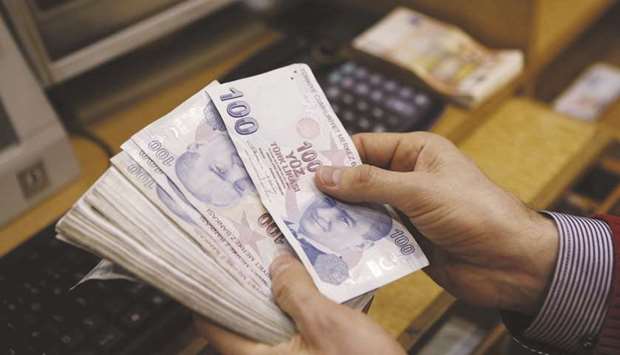Turkey’s central bank chief signalled on Thursday that aggressive policy easing would likely pause in January after one more rate cut this month, according to participants on an investor call that came after a historic lira selloff.
Turkish President Recep Tayyip Erdogan separately chose Nureddin Nebati, a strong supporter of his low rate policy, as treasury and finance minister overnight after Lutfi Elvan, who was seen as having more orthodox views, resigned the post.
The currency held flat at 13.42 versus the dollar at 1205 GMT after hitting a record low 14.0 on Tuesday.
It has steadied since the central bank intervened on Wednesday to calm “unhealthy” market moves, after a 30% crash last month that was Turkey’s second-worst ever.
It is down 44% since the start of the year.
The selloff has been driven by a series of rate cuts to 15% from 19% in September, even as annual inflation hits 20%. It is expected to near 30% next year following the lira depreciation.
Economists have widely criticised the stimulus as reckless.
Turks say the currency plunge and soaring prices have upended household budgets and future plans.
On the monthly conference call, Central Bank governor Sahap Kavcioglu — appointed by Erdogan in March — told local investors there was some limited room for another rate cut this month, four participants told Reuters.
“I got the impression that he will pause (easing) and watch for some time in 2022 after a final limited cut in December,” said one participant who requested anonymity.
Kavcioglu signalled that the bank was “almost done for the time being”, said another participant on the call, which was closed to the press.
In its policy statement last month, when it cut rates by another 100 basis points, the bank said it would consider using its “limited” room for more easing at its December 16 meeting.
Turkish bonds have risen despite the rate cuts, suggesting traders expect a central bank U-turn.
Money markets are pricing in a policy rate rise to 24% over the next year, and that it will stay above 22% for years.
Call participants said Kavcioglu had echoed Erdogan’s view that policy needed to boost investments and exports while limiting imports, and that the effects of the easing would be observed in the first half of 2022.

The lira is down 44% since the start of the year
